Entrepreneurship & Small Business: Ventures, Impact, and Skills
VerifiedAdded on 2024/05/21
|27
|5124
|252
Report
AI Summary
This report provides a comprehensive overview of entrepreneurship and small business management, examining various types of entrepreneurial ventures, including public, private, and social enterprises, and their relationship to the typology of entrepreneurship. It investigates the scope, development, and growth of entrepreneurial ventures, highlighting the differences between small, medium, and large businesses and their impact on the economy at local, regional, national, and international levels. The report also assesses the importance of small businesses and start-ups on the growth of the social economy. Furthermore, it delves into the characteristics, skills, and motivational drivers of successful entrepreneurs, exploring how personality, background, and past experiences can influence entrepreneurship, both positively and negatively, with specific examples and relevant data and statistics to support the analysis.
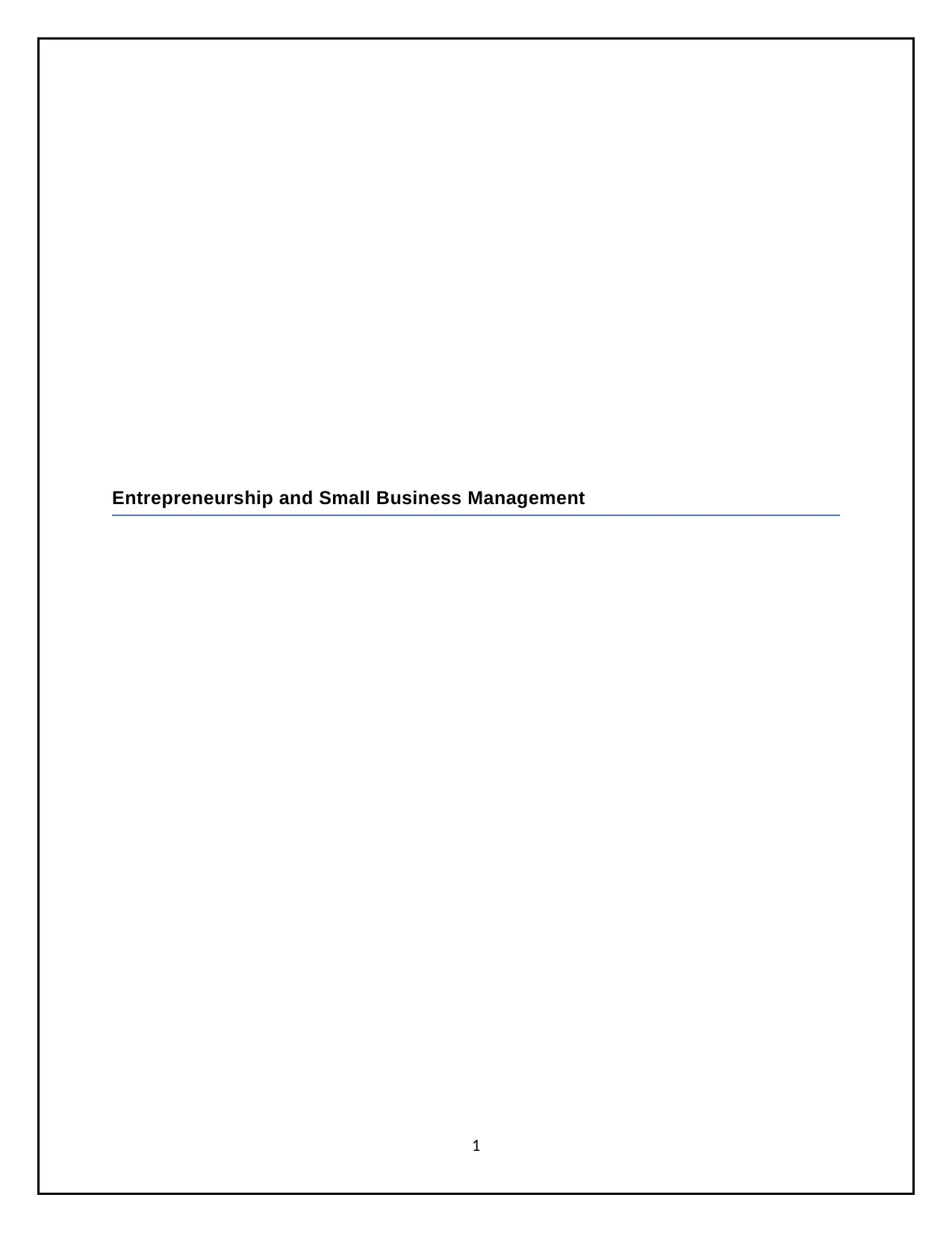
Entrepreneurship and Small Business Management
1
1
Paraphrase This Document
Need a fresh take? Get an instant paraphrase of this document with our AI Paraphraser
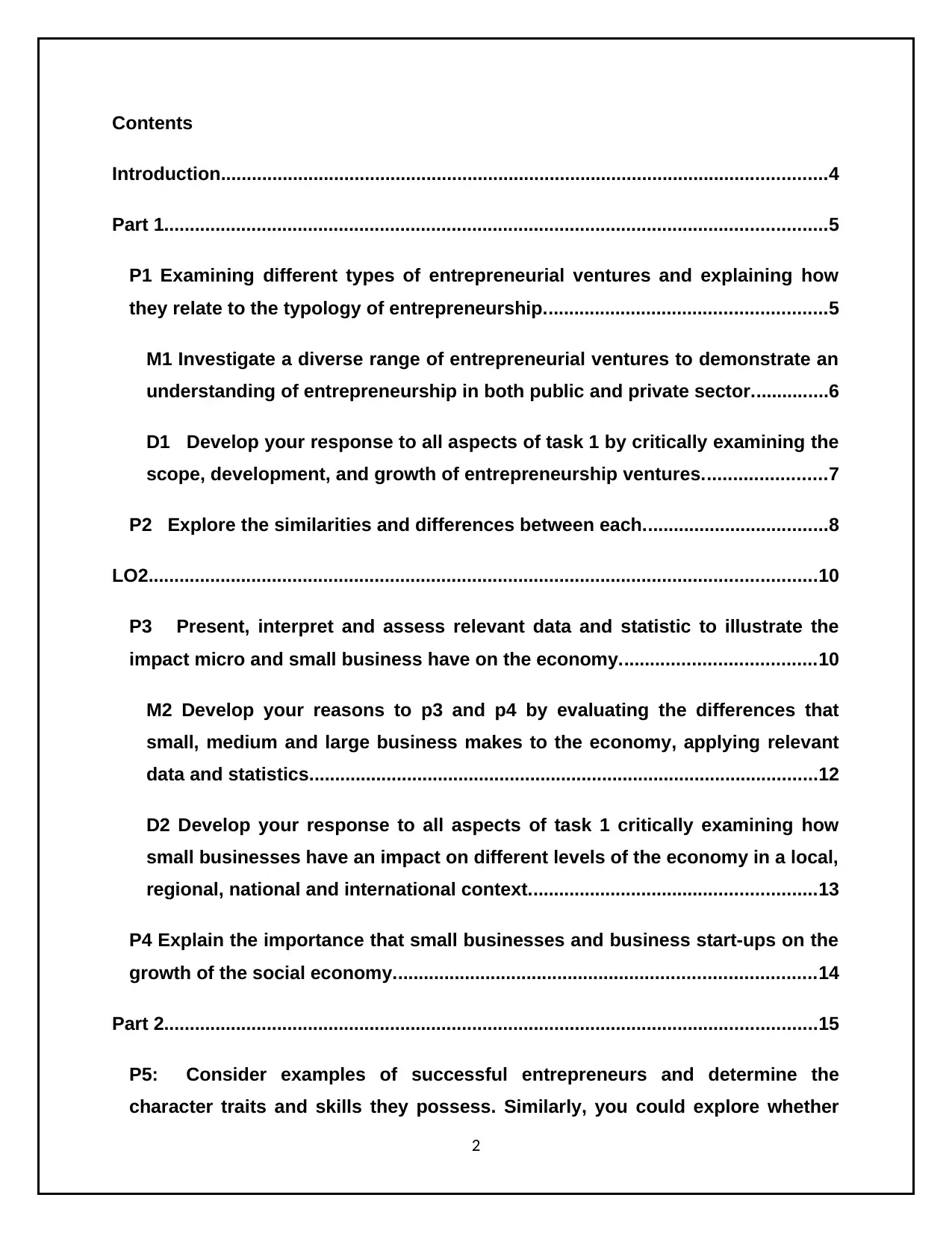
Contents
Introduction......................................................................................................................4
Part 1.................................................................................................................................5
P1 Examining different types of entrepreneurial ventures and explaining how
they relate to the typology of entrepreneurship.......................................................5
M1 Investigate a diverse range of entrepreneurial ventures to demonstrate an
understanding of entrepreneurship in both public and private sector...............6
D1 Develop your response to all aspects of task 1 by critically examining the
scope, development, and growth of entrepreneurship ventures........................7
P2 Explore the similarities and differences between each....................................8
LO2..................................................................................................................................10
P3 Present, interpret and assess relevant data and statistic to illustrate the
impact micro and small business have on the economy......................................10
M2 Develop your reasons to p3 and p4 by evaluating the differences that
small, medium and large business makes to the economy, applying relevant
data and statistics...................................................................................................12
D2 Develop your response to all aspects of task 1 critically examining how
small businesses have an impact on different levels of the economy in a local,
regional, national and international context........................................................13
P4 Explain the importance that small businesses and business start-ups on the
growth of the social economy..................................................................................14
Part 2...............................................................................................................................15
P5: Consider examples of successful entrepreneurs and determine the
character traits and skills they possess. Similarly, you could explore whether
2
Introduction......................................................................................................................4
Part 1.................................................................................................................................5
P1 Examining different types of entrepreneurial ventures and explaining how
they relate to the typology of entrepreneurship.......................................................5
M1 Investigate a diverse range of entrepreneurial ventures to demonstrate an
understanding of entrepreneurship in both public and private sector...............6
D1 Develop your response to all aspects of task 1 by critically examining the
scope, development, and growth of entrepreneurship ventures........................7
P2 Explore the similarities and differences between each....................................8
LO2..................................................................................................................................10
P3 Present, interpret and assess relevant data and statistic to illustrate the
impact micro and small business have on the economy......................................10
M2 Develop your reasons to p3 and p4 by evaluating the differences that
small, medium and large business makes to the economy, applying relevant
data and statistics...................................................................................................12
D2 Develop your response to all aspects of task 1 critically examining how
small businesses have an impact on different levels of the economy in a local,
regional, national and international context........................................................13
P4 Explain the importance that small businesses and business start-ups on the
growth of the social economy..................................................................................14
Part 2...............................................................................................................................15
P5: Consider examples of successful entrepreneurs and determine the
character traits and skills they possess. Similarly, you could explore whether
2
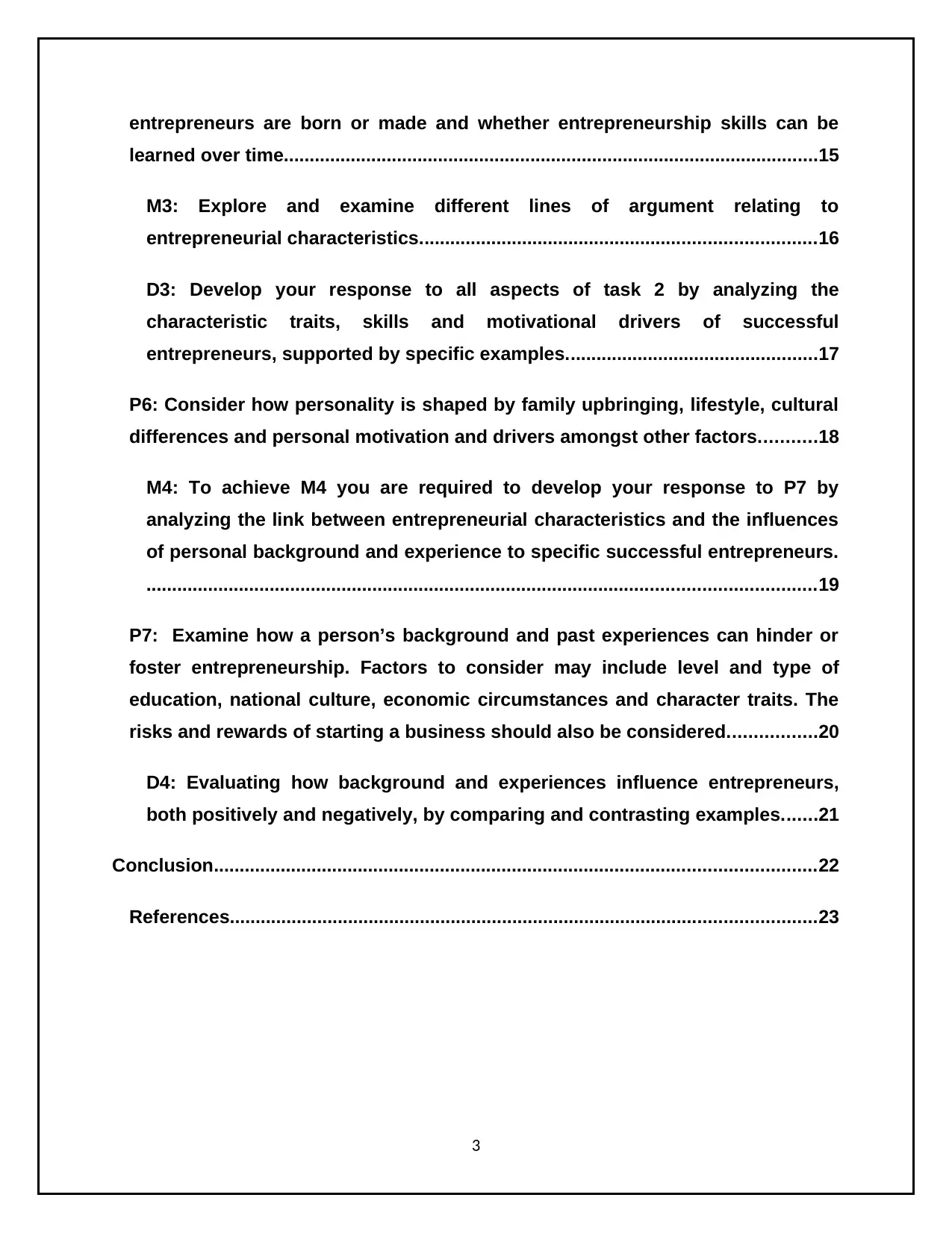
entrepreneurs are born or made and whether entrepreneurship skills can be
learned over time........................................................................................................15
M3: Explore and examine different lines of argument relating to
entrepreneurial characteristics.............................................................................16
D3: Develop your response to all aspects of task 2 by analyzing the
characteristic traits, skills and motivational drivers of successful
entrepreneurs, supported by specific examples.................................................17
P6: Consider how personality is shaped by family upbringing, lifestyle, cultural
differences and personal motivation and drivers amongst other factors...........18
M4: To achieve M4 you are required to develop your response to P7 by
analyzing the link between entrepreneurial characteristics and the influences
of personal background and experience to specific successful entrepreneurs.
..................................................................................................................................19
P7: Examine how a person’s background and past experiences can hinder or
foster entrepreneurship. Factors to consider may include level and type of
education, national culture, economic circumstances and character traits. The
risks and rewards of starting a business should also be considered.................20
D4: Evaluating how background and experiences influence entrepreneurs,
both positively and negatively, by comparing and contrasting examples.......21
Conclusion.....................................................................................................................22
References..................................................................................................................23
3
learned over time........................................................................................................15
M3: Explore and examine different lines of argument relating to
entrepreneurial characteristics.............................................................................16
D3: Develop your response to all aspects of task 2 by analyzing the
characteristic traits, skills and motivational drivers of successful
entrepreneurs, supported by specific examples.................................................17
P6: Consider how personality is shaped by family upbringing, lifestyle, cultural
differences and personal motivation and drivers amongst other factors...........18
M4: To achieve M4 you are required to develop your response to P7 by
analyzing the link between entrepreneurial characteristics and the influences
of personal background and experience to specific successful entrepreneurs.
..................................................................................................................................19
P7: Examine how a person’s background and past experiences can hinder or
foster entrepreneurship. Factors to consider may include level and type of
education, national culture, economic circumstances and character traits. The
risks and rewards of starting a business should also be considered.................20
D4: Evaluating how background and experiences influence entrepreneurs,
both positively and negatively, by comparing and contrasting examples.......21
Conclusion.....................................................................................................................22
References..................................................................................................................23
3
⊘ This is a preview!⊘
Do you want full access?
Subscribe today to unlock all pages.

Trusted by 1+ million students worldwide
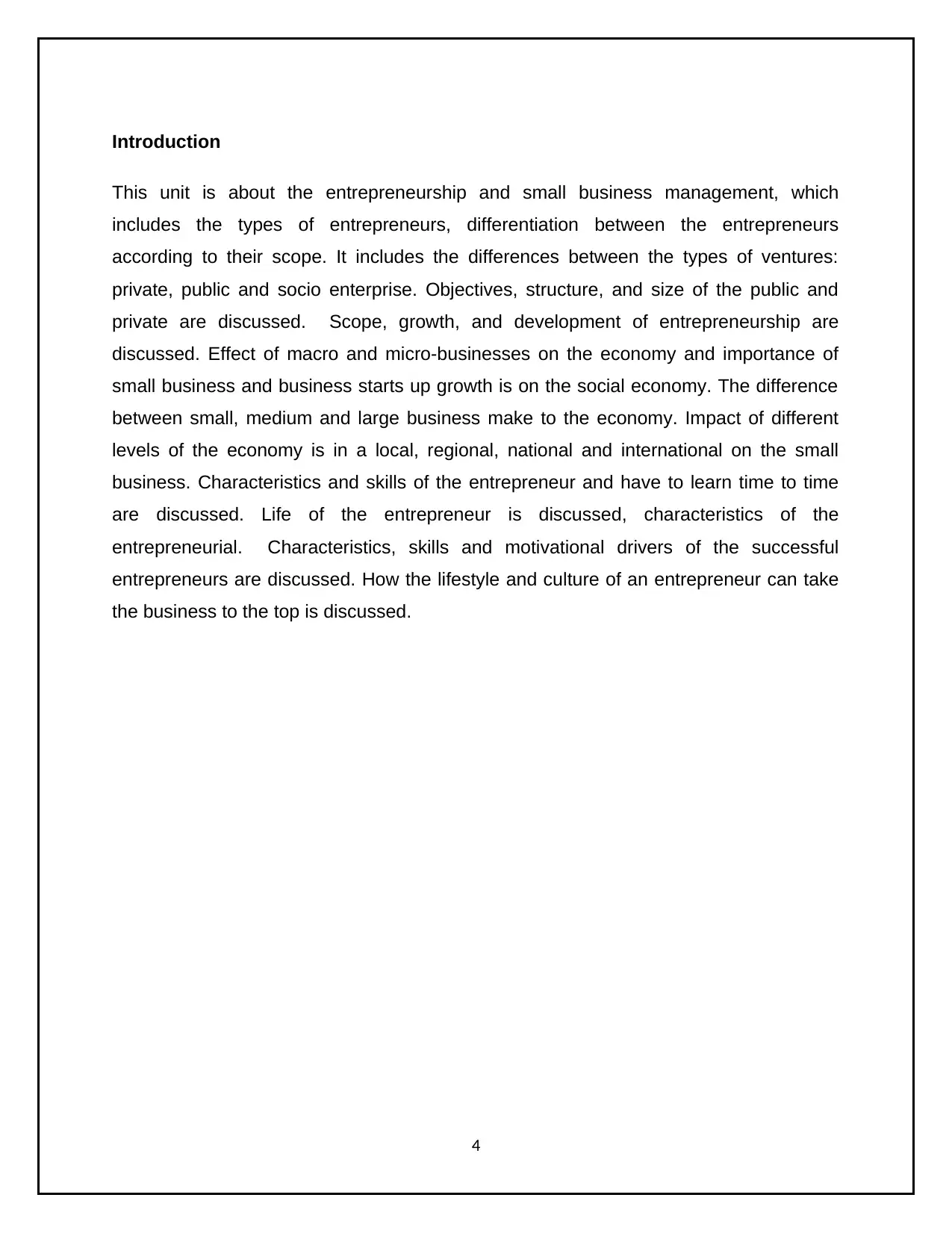
Introduction
This unit is about the entrepreneurship and small business management, which
includes the types of entrepreneurs, differentiation between the entrepreneurs
according to their scope. It includes the differences between the types of ventures:
private, public and socio enterprise. Objectives, structure, and size of the public and
private are discussed. Scope, growth, and development of entrepreneurship are
discussed. Effect of macro and micro-businesses on the economy and importance of
small business and business starts up growth is on the social economy. The difference
between small, medium and large business make to the economy. Impact of different
levels of the economy is in a local, regional, national and international on the small
business. Characteristics and skills of the entrepreneur and have to learn time to time
are discussed. Life of the entrepreneur is discussed, characteristics of the
entrepreneurial. Characteristics, skills and motivational drivers of the successful
entrepreneurs are discussed. How the lifestyle and culture of an entrepreneur can take
the business to the top is discussed.
4
This unit is about the entrepreneurship and small business management, which
includes the types of entrepreneurs, differentiation between the entrepreneurs
according to their scope. It includes the differences between the types of ventures:
private, public and socio enterprise. Objectives, structure, and size of the public and
private are discussed. Scope, growth, and development of entrepreneurship are
discussed. Effect of macro and micro-businesses on the economy and importance of
small business and business starts up growth is on the social economy. The difference
between small, medium and large business make to the economy. Impact of different
levels of the economy is in a local, regional, national and international on the small
business. Characteristics and skills of the entrepreneur and have to learn time to time
are discussed. Life of the entrepreneur is discussed, characteristics of the
entrepreneurial. Characteristics, skills and motivational drivers of the successful
entrepreneurs are discussed. How the lifestyle and culture of an entrepreneur can take
the business to the top is discussed.
4
Paraphrase This Document
Need a fresh take? Get an instant paraphrase of this document with our AI Paraphraser
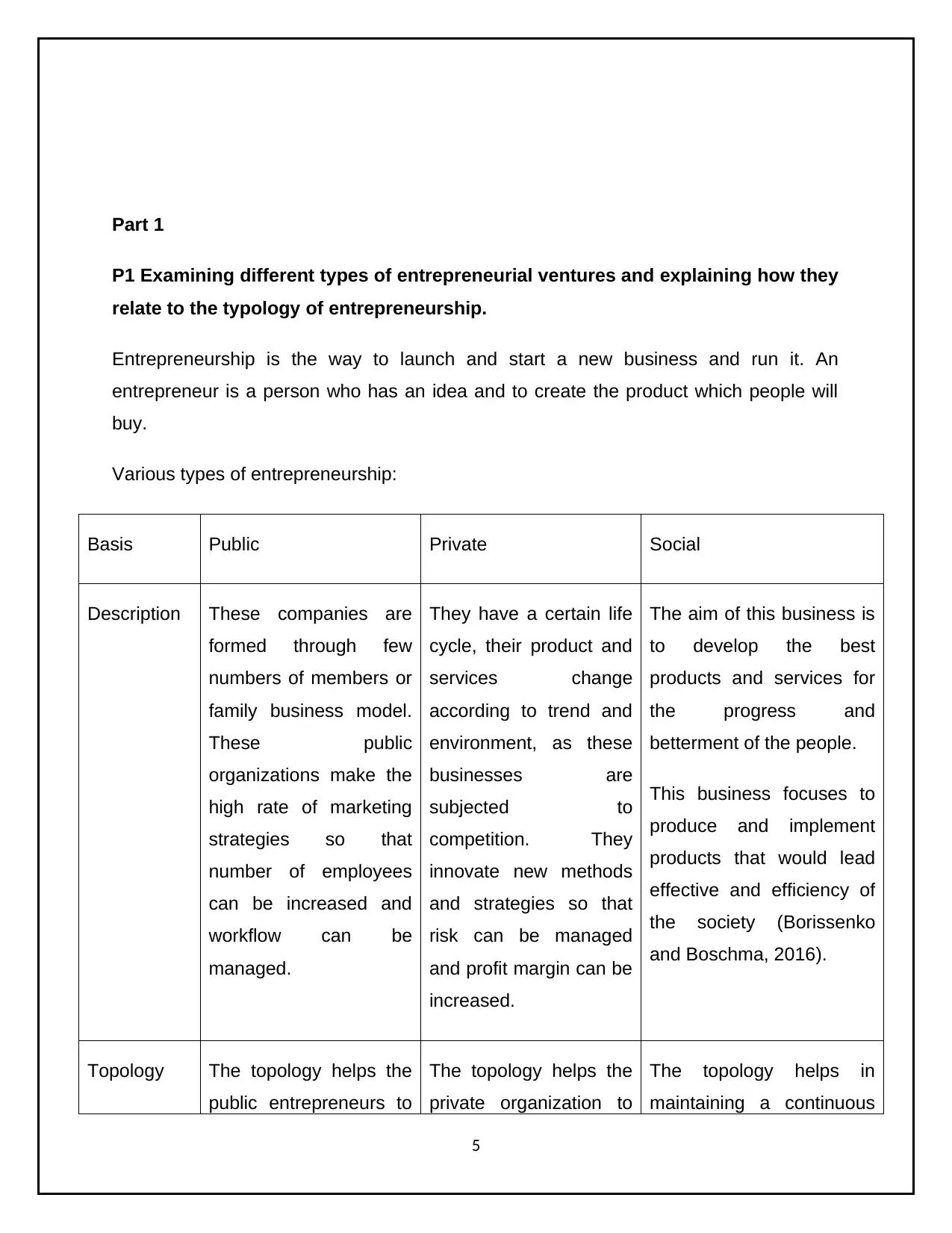
Part 1
P1 Examining different types of entrepreneurial ventures and explaining how they
relate to the typology of entrepreneurship.
Entrepreneurship is the way to launch and start a new business and run it. An
entrepreneur is a person who has an idea and to create the product which people will
buy.
Various types of entrepreneurship:
Basis Public Private Social
Description These companies are
formed through few
numbers of members or
family business model.
These public
organizations make the
high rate of marketing
strategies so that
number of employees
can be increased and
workflow can be
managed.
They have a certain life
cycle, their product and
services change
according to trend and
environment, as these
businesses are
subjected to
competition. They
innovate new methods
and strategies so that
risk can be managed
and profit margin can be
increased.
The aim of this business is
to develop the best
products and services for
the progress and
betterment of the people.
This business focuses to
produce and implement
products that would lead
effective and efficiency of
the society (Borissenko
and Boschma, 2016).
Topology The topology helps the
public entrepreneurs to
The topology helps the
private organization to
The topology helps in
maintaining a continuous
5
P1 Examining different types of entrepreneurial ventures and explaining how they
relate to the typology of entrepreneurship.
Entrepreneurship is the way to launch and start a new business and run it. An
entrepreneur is a person who has an idea and to create the product which people will
buy.
Various types of entrepreneurship:
Basis Public Private Social
Description These companies are
formed through few
numbers of members or
family business model.
These public
organizations make the
high rate of marketing
strategies so that
number of employees
can be increased and
workflow can be
managed.
They have a certain life
cycle, their product and
services change
according to trend and
environment, as these
businesses are
subjected to
competition. They
innovate new methods
and strategies so that
risk can be managed
and profit margin can be
increased.
The aim of this business is
to develop the best
products and services for
the progress and
betterment of the people.
This business focuses to
produce and implement
products that would lead
effective and efficiency of
the society (Borissenko
and Boschma, 2016).
Topology The topology helps the
public entrepreneurs to
The topology helps the
private organization to
The topology helps in
maintaining a continuous
5
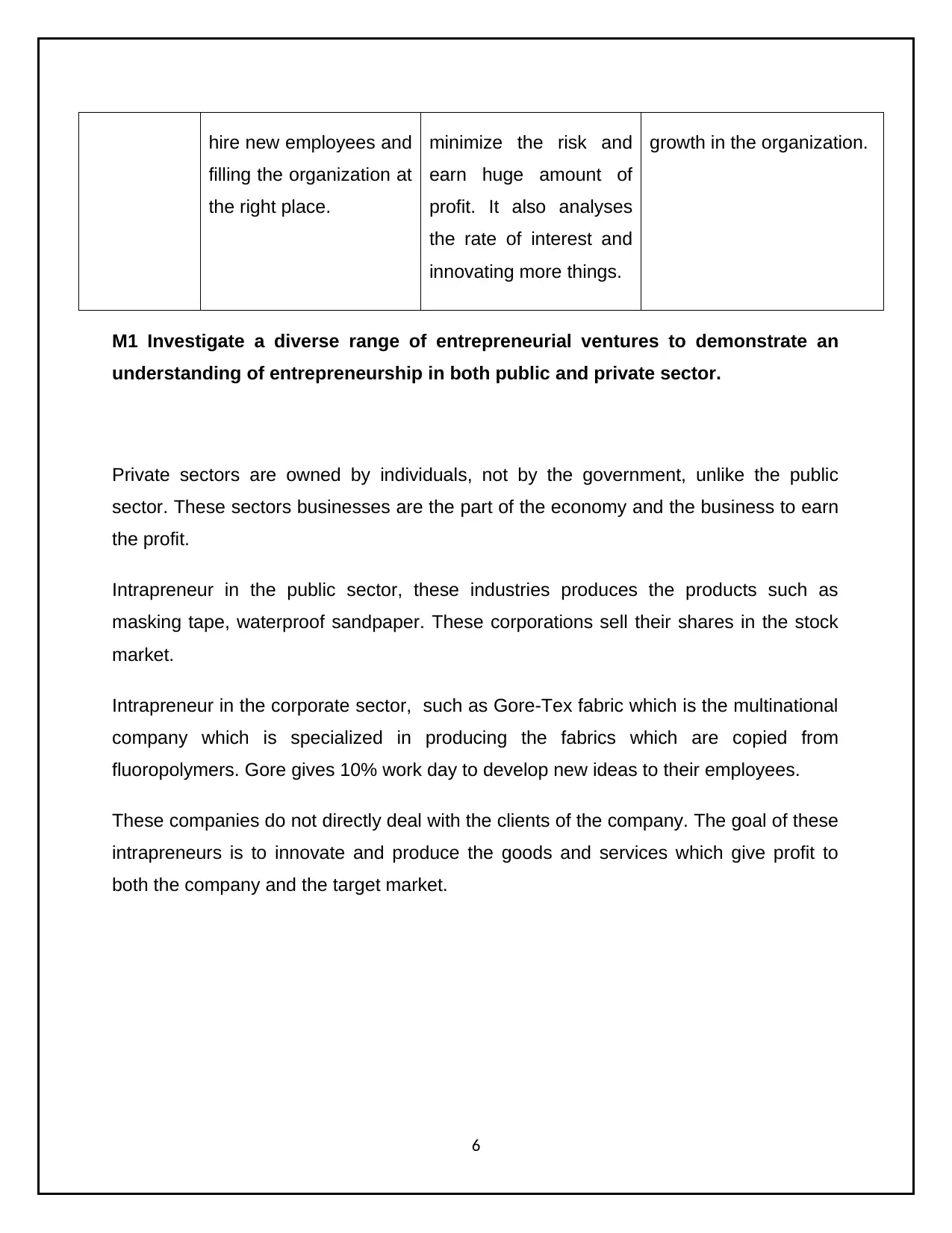
hire new employees and
filling the organization at
the right place.
minimize the risk and
earn huge amount of
profit. It also analyses
the rate of interest and
innovating more things.
growth in the organization.
M1 Investigate a diverse range of entrepreneurial ventures to demonstrate an
understanding of entrepreneurship in both public and private sector.
Private sectors are owned by individuals, not by the government, unlike the public
sector. These sectors businesses are the part of the economy and the business to earn
the profit.
Intrapreneur in the public sector, these industries produces the products such as
masking tape, waterproof sandpaper. These corporations sell their shares in the stock
market.
Intrapreneur in the corporate sector, such as Gore-Tex fabric which is the multinational
company which is specialized in producing the fabrics which are copied from
fluoropolymers. Gore gives 10% work day to develop new ideas to their employees.
These companies do not directly deal with the clients of the company. The goal of these
intrapreneurs is to innovate and produce the goods and services which give profit to
both the company and the target market.
6
filling the organization at
the right place.
minimize the risk and
earn huge amount of
profit. It also analyses
the rate of interest and
innovating more things.
growth in the organization.
M1 Investigate a diverse range of entrepreneurial ventures to demonstrate an
understanding of entrepreneurship in both public and private sector.
Private sectors are owned by individuals, not by the government, unlike the public
sector. These sectors businesses are the part of the economy and the business to earn
the profit.
Intrapreneur in the public sector, these industries produces the products such as
masking tape, waterproof sandpaper. These corporations sell their shares in the stock
market.
Intrapreneur in the corporate sector, such as Gore-Tex fabric which is the multinational
company which is specialized in producing the fabrics which are copied from
fluoropolymers. Gore gives 10% work day to develop new ideas to their employees.
These companies do not directly deal with the clients of the company. The goal of these
intrapreneurs is to innovate and produce the goods and services which give profit to
both the company and the target market.
6
⊘ This is a preview!⊘
Do you want full access?
Subscribe today to unlock all pages.

Trusted by 1+ million students worldwide
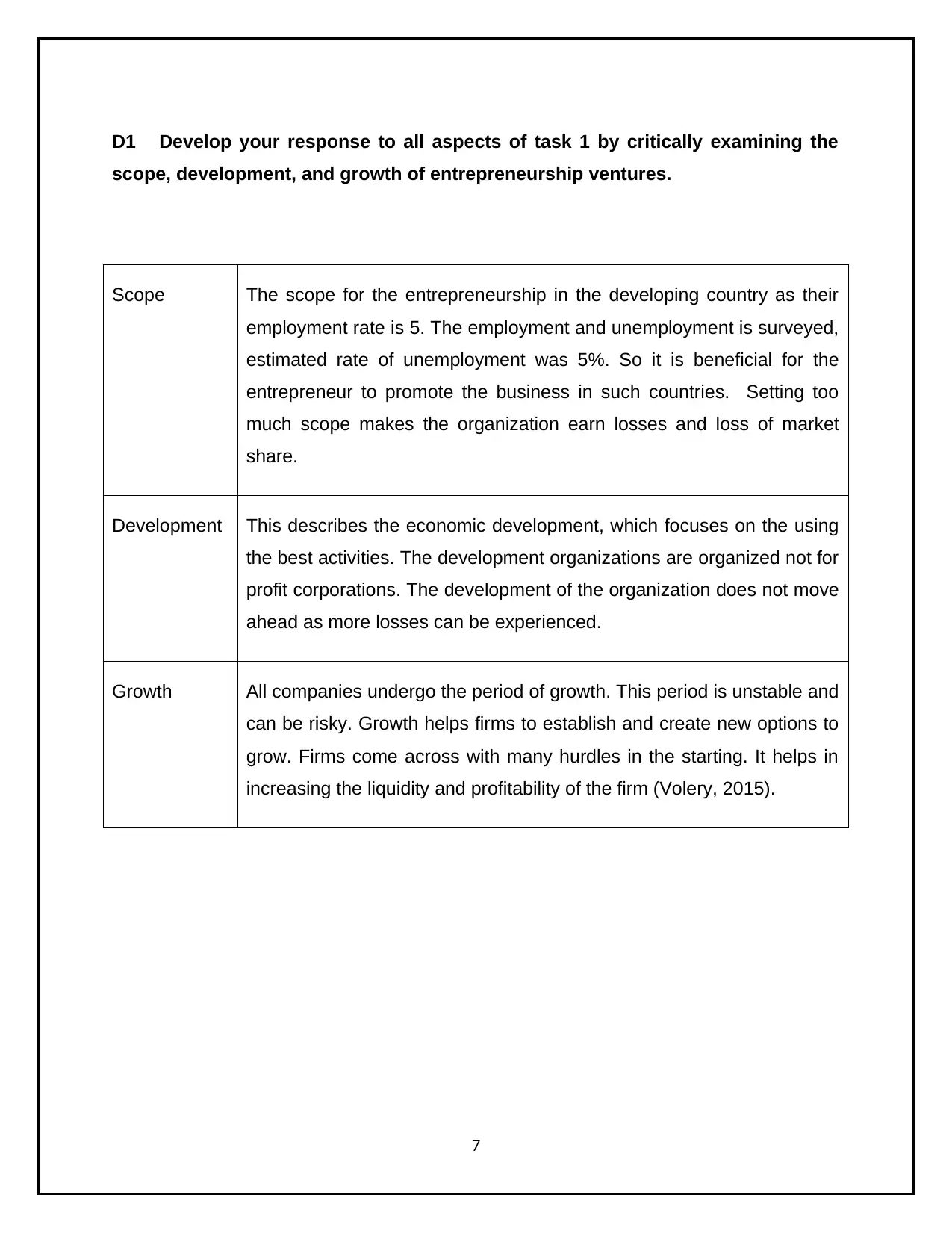
D1 Develop your response to all aspects of task 1 by critically examining the
scope, development, and growth of entrepreneurship ventures.
Scope The scope for the entrepreneurship in the developing country as their
employment rate is 5. The employment and unemployment is surveyed,
estimated rate of unemployment was 5%. So it is beneficial for the
entrepreneur to promote the business in such countries. Setting too
much scope makes the organization earn losses and loss of market
share.
Development This describes the economic development, which focuses on the using
the best activities. The development organizations are organized not for
profit corporations. The development of the organization does not move
ahead as more losses can be experienced.
Growth All companies undergo the period of growth. This period is unstable and
can be risky. Growth helps firms to establish and create new options to
grow. Firms come across with many hurdles in the starting. It helps in
increasing the liquidity and profitability of the firm (Volery, 2015).
7
scope, development, and growth of entrepreneurship ventures.
Scope The scope for the entrepreneurship in the developing country as their
employment rate is 5. The employment and unemployment is surveyed,
estimated rate of unemployment was 5%. So it is beneficial for the
entrepreneur to promote the business in such countries. Setting too
much scope makes the organization earn losses and loss of market
share.
Development This describes the economic development, which focuses on the using
the best activities. The development organizations are organized not for
profit corporations. The development of the organization does not move
ahead as more losses can be experienced.
Growth All companies undergo the period of growth. This period is unstable and
can be risky. Growth helps firms to establish and create new options to
grow. Firms come across with many hurdles in the starting. It helps in
increasing the liquidity and profitability of the firm (Volery, 2015).
7
Paraphrase This Document
Need a fresh take? Get an instant paraphrase of this document with our AI Paraphraser
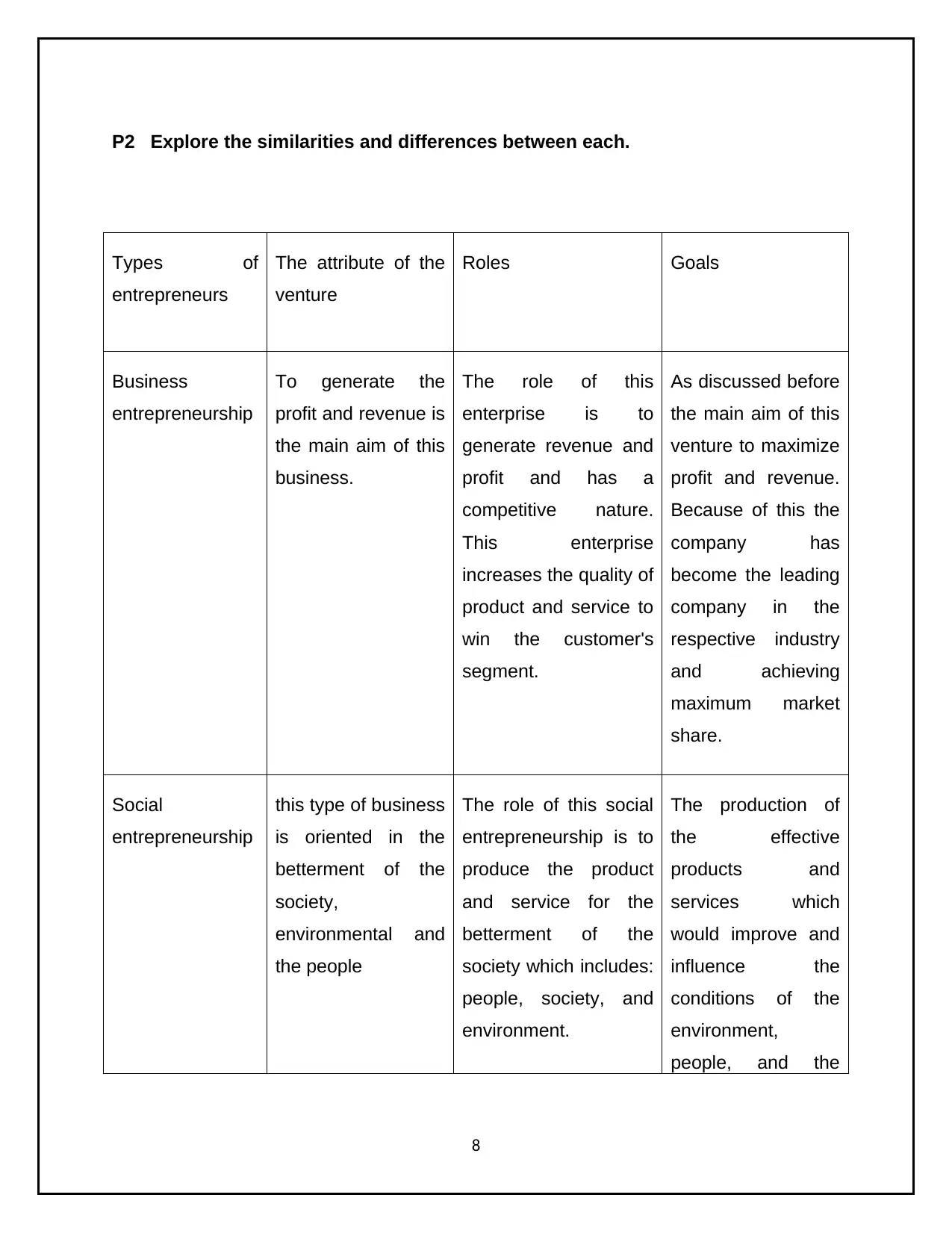
P2 Explore the similarities and differences between each.
Types of
entrepreneurs
The attribute of the
venture
Roles Goals
Business
entrepreneurship
To generate the
profit and revenue is
the main aim of this
business.
The role of this
enterprise is to
generate revenue and
profit and has a
competitive nature.
This enterprise
increases the quality of
product and service to
win the customer's
segment.
As discussed before
the main aim of this
venture to maximize
profit and revenue.
Because of this the
company has
become the leading
company in the
respective industry
and achieving
maximum market
share.
Social
entrepreneurship
this type of business
is oriented in the
betterment of the
society,
environmental and
the people
The role of this social
entrepreneurship is to
produce the product
and service for the
betterment of the
society which includes:
people, society, and
environment.
The production of
the effective
products and
services which
would improve and
influence the
conditions of the
environment,
people, and the
8
Types of
entrepreneurs
The attribute of the
venture
Roles Goals
Business
entrepreneurship
To generate the
profit and revenue is
the main aim of this
business.
The role of this
enterprise is to
generate revenue and
profit and has a
competitive nature.
This enterprise
increases the quality of
product and service to
win the customer's
segment.
As discussed before
the main aim of this
venture to maximize
profit and revenue.
Because of this the
company has
become the leading
company in the
respective industry
and achieving
maximum market
share.
Social
entrepreneurship
this type of business
is oriented in the
betterment of the
society,
environmental and
the people
The role of this social
entrepreneurship is to
produce the product
and service for the
betterment of the
society which includes:
people, society, and
environment.
The production of
the effective
products and
services which
would improve and
influence the
conditions of the
environment,
people, and the
8
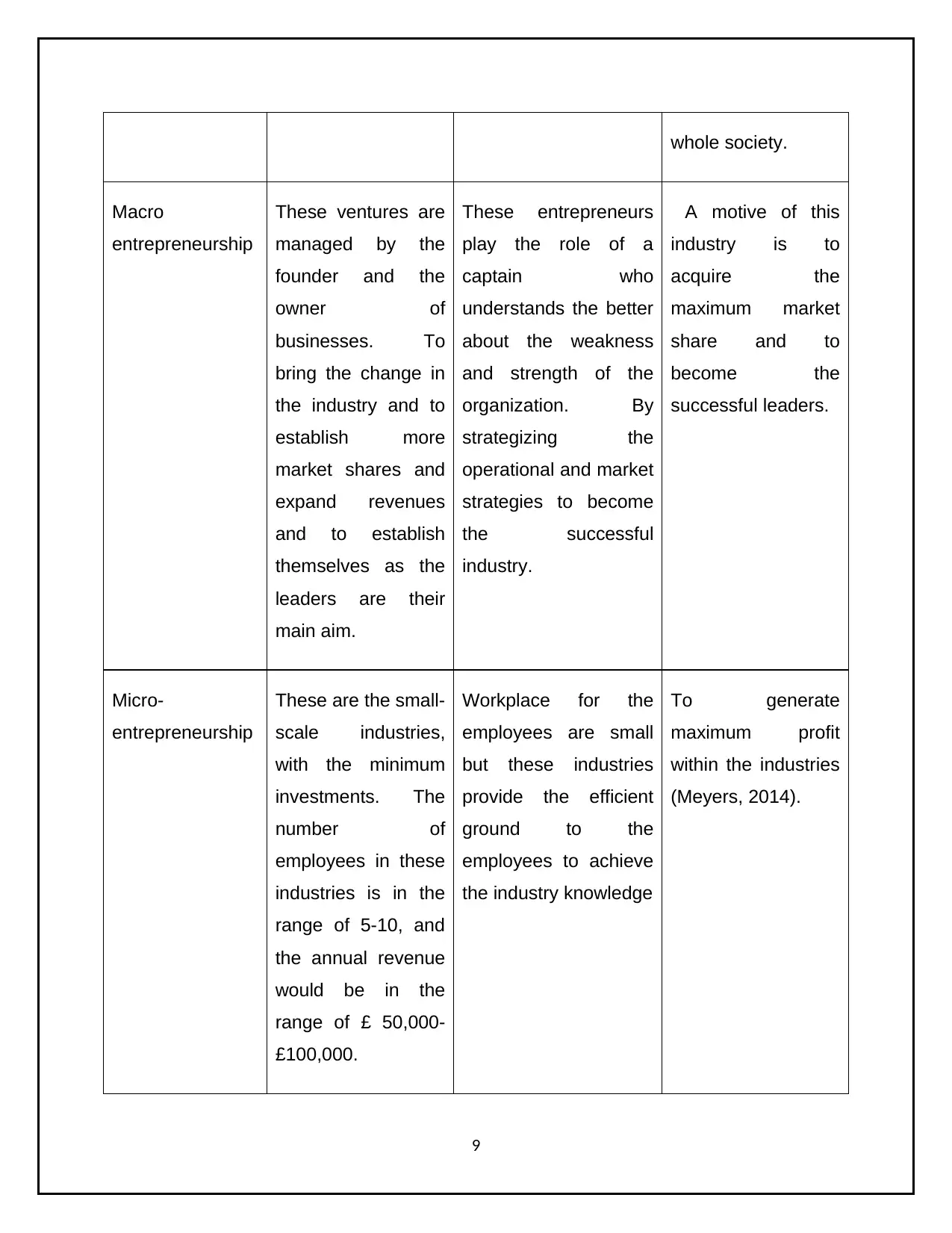
whole society.
Macro
entrepreneurship
These ventures are
managed by the
founder and the
owner of
businesses. To
bring the change in
the industry and to
establish more
market shares and
expand revenues
and to establish
themselves as the
leaders are their
main aim.
These entrepreneurs
play the role of a
captain who
understands the better
about the weakness
and strength of the
organization. By
strategizing the
operational and market
strategies to become
the successful
industry.
A motive of this
industry is to
acquire the
maximum market
share and to
become the
successful leaders.
Micro-
entrepreneurship
These are the small-
scale industries,
with the minimum
investments. The
number of
employees in these
industries is in the
range of 5-10, and
the annual revenue
would be in the
range of £ 50,000-
£100,000.
Workplace for the
employees are small
but these industries
provide the efficient
ground to the
employees to achieve
the industry knowledge
To generate
maximum profit
within the industries
(Meyers, 2014).
9
Macro
entrepreneurship
These ventures are
managed by the
founder and the
owner of
businesses. To
bring the change in
the industry and to
establish more
market shares and
expand revenues
and to establish
themselves as the
leaders are their
main aim.
These entrepreneurs
play the role of a
captain who
understands the better
about the weakness
and strength of the
organization. By
strategizing the
operational and market
strategies to become
the successful
industry.
A motive of this
industry is to
acquire the
maximum market
share and to
become the
successful leaders.
Micro-
entrepreneurship
These are the small-
scale industries,
with the minimum
investments. The
number of
employees in these
industries is in the
range of 5-10, and
the annual revenue
would be in the
range of £ 50,000-
£100,000.
Workplace for the
employees are small
but these industries
provide the efficient
ground to the
employees to achieve
the industry knowledge
To generate
maximum profit
within the industries
(Meyers, 2014).
9
⊘ This is a preview!⊘
Do you want full access?
Subscribe today to unlock all pages.

Trusted by 1+ million students worldwide

10
Paraphrase This Document
Need a fresh take? Get an instant paraphrase of this document with our AI Paraphraser
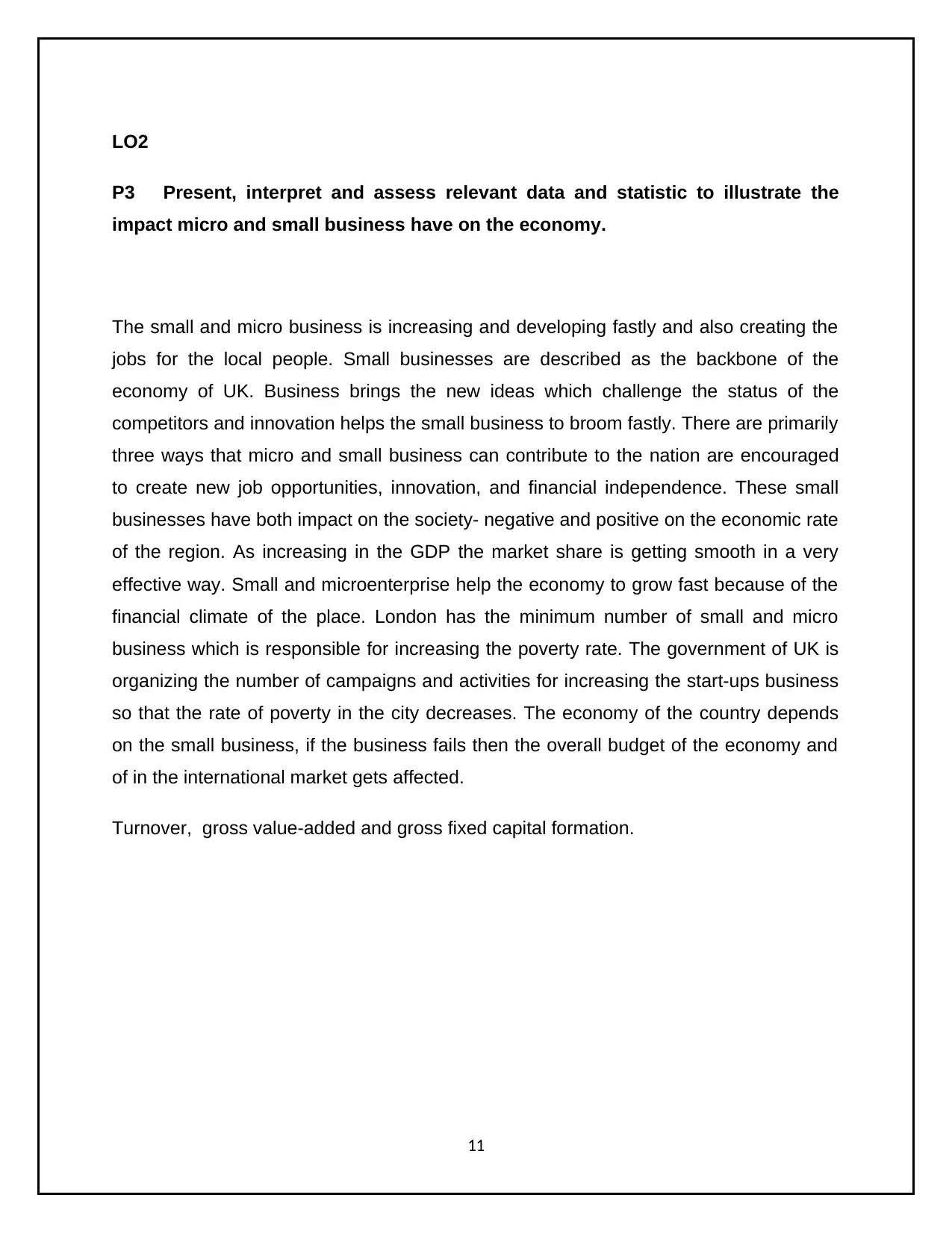
LO2
P3 Present, interpret and assess relevant data and statistic to illustrate the
impact micro and small business have on the economy.
The small and micro business is increasing and developing fastly and also creating the
jobs for the local people. Small businesses are described as the backbone of the
economy of UK. Business brings the new ideas which challenge the status of the
competitors and innovation helps the small business to broom fastly. There are primarily
three ways that micro and small business can contribute to the nation are encouraged
to create new job opportunities, innovation, and financial independence. These small
businesses have both impact on the society- negative and positive on the economic rate
of the region. As increasing in the GDP the market share is getting smooth in a very
effective way. Small and microenterprise help the economy to grow fast because of the
financial climate of the place. London has the minimum number of small and micro
business which is responsible for increasing the poverty rate. The government of UK is
organizing the number of campaigns and activities for increasing the start-ups business
so that the rate of poverty in the city decreases. The economy of the country depends
on the small business, if the business fails then the overall budget of the economy and
of in the international market gets affected.
Turnover, gross value-added and gross fixed capital formation.
11
P3 Present, interpret and assess relevant data and statistic to illustrate the
impact micro and small business have on the economy.
The small and micro business is increasing and developing fastly and also creating the
jobs for the local people. Small businesses are described as the backbone of the
economy of UK. Business brings the new ideas which challenge the status of the
competitors and innovation helps the small business to broom fastly. There are primarily
three ways that micro and small business can contribute to the nation are encouraged
to create new job opportunities, innovation, and financial independence. These small
businesses have both impact on the society- negative and positive on the economic rate
of the region. As increasing in the GDP the market share is getting smooth in a very
effective way. Small and microenterprise help the economy to grow fast because of the
financial climate of the place. London has the minimum number of small and micro
business which is responsible for increasing the poverty rate. The government of UK is
organizing the number of campaigns and activities for increasing the start-ups business
so that the rate of poverty in the city decreases. The economy of the country depends
on the small business, if the business fails then the overall budget of the economy and
of in the international market gets affected.
Turnover, gross value-added and gross fixed capital formation.
11

(Figure: 1)
(Source: Destatis, 2018)
12
(Source: Destatis, 2018)
12
⊘ This is a preview!⊘
Do you want full access?
Subscribe today to unlock all pages.

Trusted by 1+ million students worldwide
1 out of 27
Related Documents
Your All-in-One AI-Powered Toolkit for Academic Success.
+13062052269
info@desklib.com
Available 24*7 on WhatsApp / Email
![[object Object]](/_next/static/media/star-bottom.7253800d.svg)
Unlock your academic potential
Copyright © 2020–2025 A2Z Services. All Rights Reserved. Developed and managed by ZUCOL.



